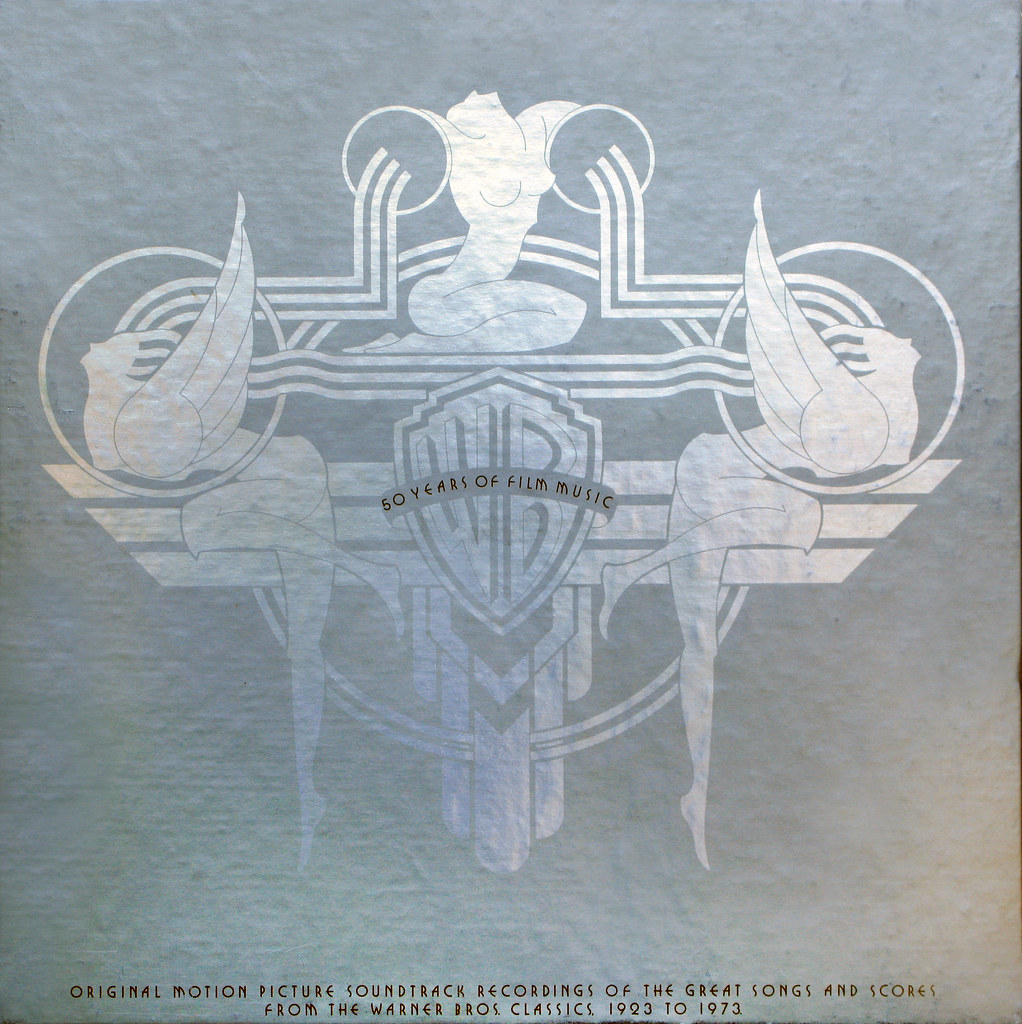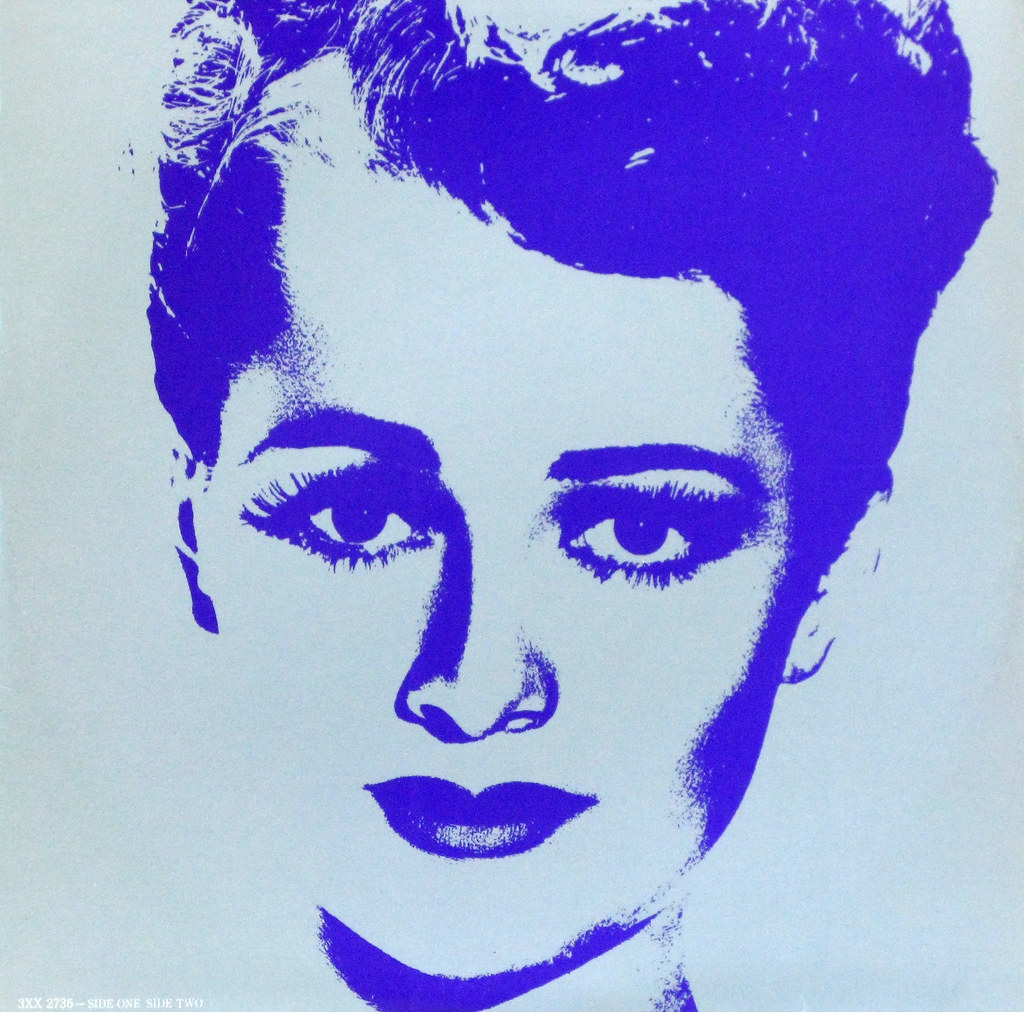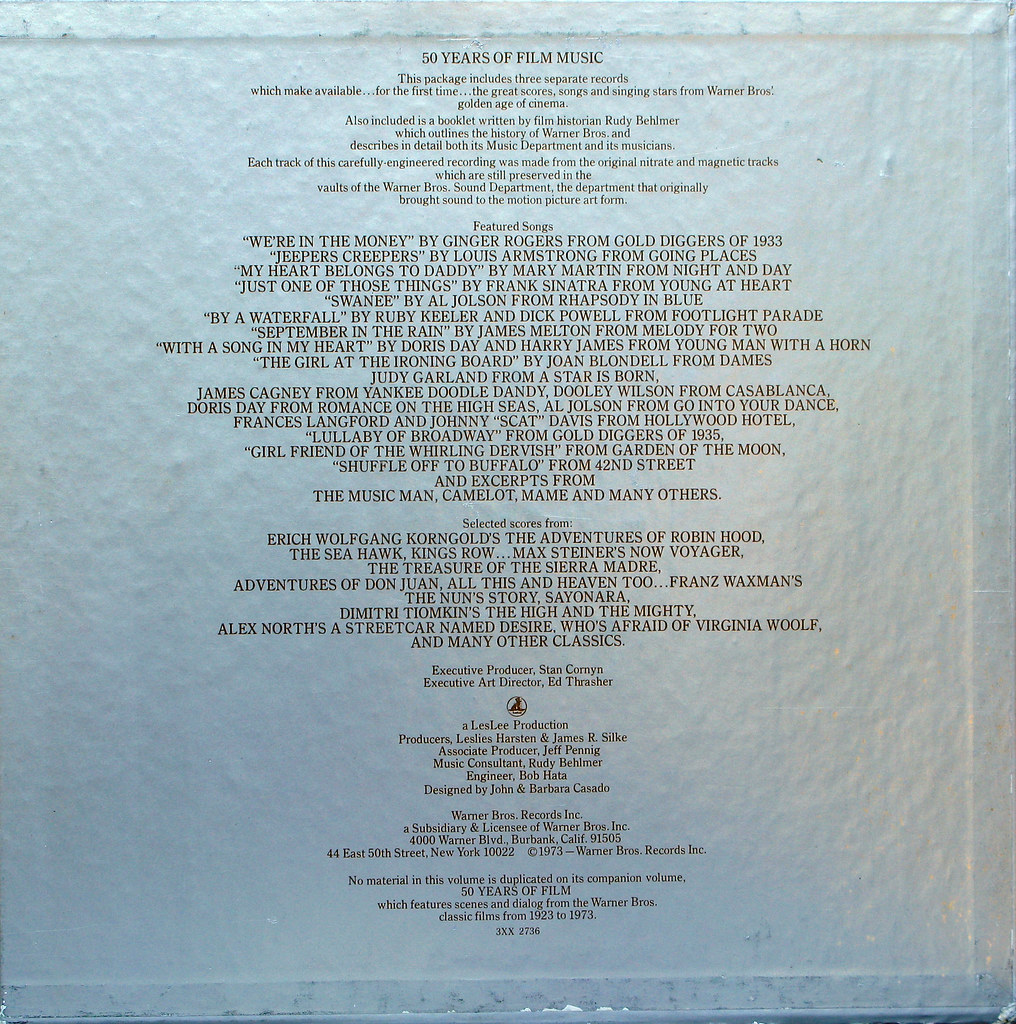
Today's compilation, first issued in 1973, preserves many eras within its silver-papered slip cover. The three albums comprising this boxed set commemorate five decades' worth of scores and memorable songs written for Warner Bros. films. To that end, 50 Years Of Film Music is successful and then some. It's a true labor of love and a good example of the synergy that could exist - but rarely did - between the film and record divisions of an entertainment empire.
As mentioned, there were three albums housed in the 50 Years... box. (A companion 3-lp boxed set, 50 Years Of Film, arrived concurrently with this set. It contained mostly dialog clips from W.B. films, with additional songs.) For the purposes of today's entry, framed by my own prejudices, I'm focusing solely on the first album, a sampler of instrumental film scores from Warners Bros.' movies. These themes, many of which will prove familiar, have been dubbed from the original mag reels used to create the sound portion of each respective film. This accounts for the tremulous, slightly 'watery' aspect of some of the older recordings heard on the album. It is obvious that much care was taken in transferring this material to vinyl. It's a shame that this collection wasn't reincarnated for the digital era. No matter, as today it - or at least one-third of it - is available to the discerning listeners who have once more stumbled upon this too-long moribund blog.

The first side of the album collates memorable stretches from three film scores written by one of the 20th Century's best film composers, Erich Wolfgang Korngold. Exuberance, of the sort as can only be conjured by someone who genuinely loves their work, fairly drips from every note of the music written by Korngold for The Sea Hawk (1940), King's Row (1942) and The Adventures Of Robin Hood (1938). The last of these, for my money, represents his most inspired soundtrack and the sound of fun itself as enjoyed on a few levels: Errol Flynn playing Sherwood Forest's reigning badass; one gleeful rout after another, as Robin and his merry band continually tweak authority's nose in the person of Basil Rathbone's Sir Guy of Gisbourne; and mostly, Korngold's enthusiasm for the enterprise, which is contagious.
During the research phase for my little book (above right) about the triumphs and travails of composer Van Dyke Parks as a Warner Bros. employee, I watched one day as Parks obsessed over music playing on his kitchen radio. The dial was tuned to U.S.C.'s classical station, whose DJ didn't back-announce the piece. Parks was genuinely in the grip of the symphonic work he'd just experienced. This episode was of special interest, as Parks has exhibited a more than healthy curiosity about the work of other musicians throughout his career, often to the extent of sidelining his own output. Rarely, though, had I seen him as smitten as he was by the broadcast on that particular day. A session violinist who worked often with Parks and who heard the same program, later gave him a recording of the piece. Turned out it was written by Korngold.

The album's B-side leapfrogs through many styles and distinct eras of film scoring. On par with Erich Korngold's work are the many scores composed by Max Steiner. The latter's writing on behalf of All This And Heaven Too (1940), The Treasure Of Sierra Madre (1948), Now, Voyager (1942) and still another Errol Flynn swashbuckler, 1948's Adventures Of Don Juan, are testament to Steiner's impressive range. His music provided the shadings and subtlety (or not) required variously by opulent period pieces, action-packed epics, psychological dramas or soap operas. These tracks are vestiges of a time when directors and audiences alike demanded and, indeed, thrived on melody and on music that hit each mark in carefully blocked scenes with the same finely calibrated timing required of the actors. 'Ambient' film music lay in wait, several decades down the track.
Scores of a more contemporary stripe are represented by the work of Alex North (whose baroque charts played off the onscreen martial combat during 1966's Who's Afraid Of Virginia Woolf?) and Dimitri Tiomkin, with his evocation of ancient Egypt conjured on behalf of Land Of The Pharaohs (1955). Two impressive Franz Waxman efforts here as well: The Nun's Story (1959) and his music for the 1957 Sayonara, the latter being a version of Madame Butterfly set against the backdrop of the Korean War.

The collection is a pip, overall, and a reminder of a time when a record company wasn't afraid to splash out on an archival project such as this. 50 Years... was overseen by Warner Bros. Records' head publicist Stan Cornyn, a Character of the old school who authored the witty ad copy that did much to identify W.B. as a home for artists of intelligence and complexity during that company's 'golden era' of the late '60s and early '70s. The Ivy League-educated Cornyn obviously cared a great deal about this music, as did Rudy Behlmer, who selected and thoughtfully annotated the tracks included here.
50 Years of Film Music - Pt. 1 @ 320
50 Years of Film Music - Pt. 2 @ 320
50 Years of Film Music - Pt. 3 @ 320
Comments
Take care,
Steven
Some of them did get licensed, however. Next time you're in town, I'll dig out my copies of some of the records that Delos put out (under their Facet label) of this music.
http://www.amazon.com/Adventures-Robin-Hood-Requiem-Cavalier/dp/B00000073B/ref=sr_1_15?s=music&ie=UTF8&qid=1297384704&sr=1-15
One of my first trips for them was to Portland to record the Korngold Seahawk Suite with James DePreist, and being a sucker for 20th century neoromanticism, I was hooked. We can put some of that on the playlist as well.
Nice to have you back in the ether, Count Reeshard!
Now, I am looking forward to pouring myself into this here blog of yours.
Jason Michael MacIsaac
paris1919records@gmail.com
Now, I am looking forward to pouring myself into this here blog of yours.
Jason Michael MacIsaac
paris1919records@gmail.com
If it's not too much trouble, I'd be thrilled if you reuploaded Demola Adepoju's "Olufe-Mi". Your site is its only mention on the internet.